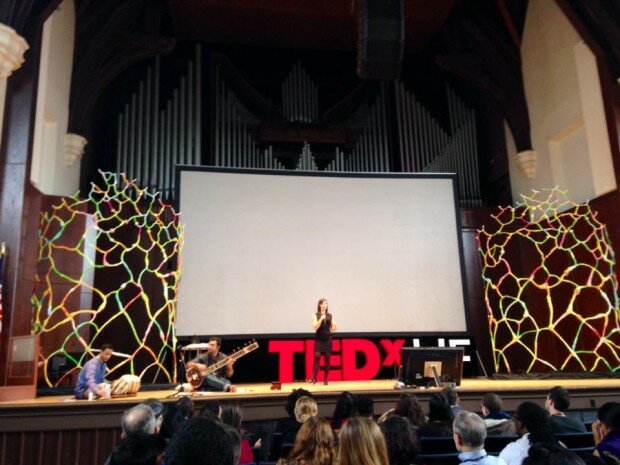As the founder of a publication based on sharing interesting information and thought provoking ideas (yes, you’re reading said publication right now), naturally, I dig TED’s mission of “ideas worth spreading.” When I found out the TEDxUF event was coming back to lil ole’ Gainesville, I was floored. From hearing the twang of an Indian sitar reverberate off the walls of the University Auditorium to learning how the UF Rocket Team engineers their product for NASA competitions, it’s safe to say my experience at the event was like no other.
For those of you that weren’t able to make it to TEDxUF, but still thirst for the ideas that were shared, have no fear. I am here to share with you the takeaway from each of 8 speakers I had the privilege of listening to. Keep in mind, however, that the powerful message of each talk cannot simply be boiled down to a few sentences, so I encourage you to not just read my interpretation, stroke your chin in an intellectual manner and then move on, but seek out additional information, watch the recorded TED talk and feed your hungry mind the knowledge it craves.

1. When Corey Souza walked on stage, my first thought was “Wow, those are some arms.” As a Ph.D. candidate in cultural anthropology at the University of Florida, she has brain strength that rivals her incredibly strong dancer physique. Her talk drew on powerful examples from performance studies and race and gender in popular culture (particularly in Brazil) to show how our perception of pop culture reflects the historical and spiritual values of our society. The takeaway? Be a contentious and critical consumer of media.
2. Jaron Jones created his personal musical narrative on stage right before the audience. From the “heartbeat” baseline to the snares, every beat he added represented an event or value in his life. The takeaway? Tell your story. It can provide you with all of the self-motivation you will ever need. Don’t let outside influences define your life.
3. Anthony Andenoro challenged the audience to consider global problems and how we approach them. From overpopulation to climate change, he stresses how creativity and intelligence in leadership can tackle even the biggest issues. The takeaway? Using emotionally intelligent instruction and instructors, we can get young people away from stagnant, unchallenging education and into the community to tackle problems in a more holistic, meaningful way.
4. Maria Carter, a natural on stage, gripped the hearts of the audience and never let go. Through her battle with recent heartbreak and cancer, she explores the notion of a society addicted to reactivity and proactivity, urging us to try receptivity instead. The takeaway? Don’t attempt to force outside situations to change and instead work inside at letting go and embracing the uncomfortable obstacles of life.
5. Bertrhude Albert and Priscilla Zelaya were an energy-packed, dynamic duo that shed light on the non-profit world through their own experiences with Projects for Haiti, Inc. They detailed misguided albeit good intentioned efforts of helping impoverished people through donations instead of empowerment. The takeaway? Fully assess a situation before you dive in to help. You’ll make a much greater impact if you figure out how to provide sustainable benefits instead of just assuming what a person/country/situation needs.
6. Christian von Kleist, the co-founder of Paracosm, a Gainesville-based startup, boasted contagious excitement and transported the audience into a world of 3D mapping. His algorithms turn handheld video data into incredibly accurate 3D representations. He shared with us his wild visions of the future with his technology blazing the way. The takeaway? Think big and bring your ideas to life.
The two video TED talks featured:
Brain researcher Jill Bolte Taylor studied her own stroke as it happened. This is my favorite TED talk of all time. The takeaway? Which side of the brain do you want to live in?
Charlie Todd is the founder of Improv Everywhere, a group that carries out ridiculous pranks in public places to cause chaos and happiness. The takeaway? There’s no “right” way to play. Go have a blast.





